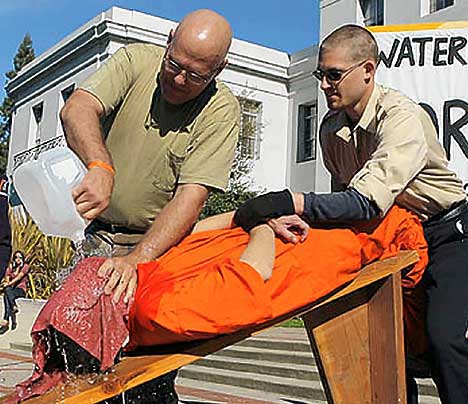Sudhan @12:02 CET
by Patrick J. Buchanan | Antiwar, Oct 14, 2008
“Liquidate labor, liquidate stocks, liquidate the farmers.”
So Treasury Secretary Andrew Mellon advised Herbert Hoover in the Great Crash of ‘29.
Hoover did. And the nation liquidated him – and the Republicans.
In the Crash of 2008, 40 percent of stock value has vanished, almost $9 trillion. Some $5 trillion in real estate value has disappeared. A recession looms with sweeping layoffs, unemployment compensation surging, and social welfare benefits soaring.
America’s first trillion-dollar deficit is at hand.
In fiscal year 2008 the deficit was $438 billion.
With tax revenue sinking, we will add to this year’s deficit the $200 to $300 billion needed to wipe the rotten paper off the books of Fannie and Freddie, the $700 billion (plus the $100 billion in add-ons and pork) for the Wall Street bailout, the $85 billion to bail out AIG, and $37 billion more now needed, the $25 billion for GM, Chrysler, and Ford, and the hundreds of billions Hank Paulson will need to buy corporate paper and bail out banks to stop the panic.
As Americans save nothing, where are the Feds going to get the money? Is the Fed going to print it and destroy the dollar and credit rating of the United States? Because the nations whose vaults are full of dollars and U.S. debt – China, Japan, Saudi Arabia, the Gulf Arabs – are reluctant to lend us more. Sovereign wealth funds that plunged billions into U.S. banks have already been burned.
Uncle Sam’s Visa card is about to be stamped “Canceled.”
The budget is going to have to go under the knife. But what gets cut?
Social Security and Medicare are surely exempt. Seniors have already taken a huge hit in their 401(k)s. And as the Democrats are crafting another $150 billion stimulus package for the working poor and middle class, Medicaid and food stamps are untouchable. Interest on the debt cannot be cut. It is going up. Will a Democratic Congress slash unemployment benefits, welfare, education, student loans, veterans benefits – in a recession?
No way. Yet, that is almost the entire U.S. budget – except for defense, the wars in Afghanistan and Iraq, and foreign aid. And this is where the ax will eventually fall.
It is the American Empire that is going to be liquidated.
Retrenchment has begun with Bush’s backing away from confrontations with Axis-of-Evil charter members Iran and North Korea over their nuclear programs, and will likely continue with a negotiated peace in Afghanistan. Gen. Petraeus and Secretary Gates are already talking “reconciliation” with the Taliban.
We no longer live in Eisenhower or Reagan’s America. Even the post-Cold War world of George H. W. Bush, where America was a global hegemon, is history. In both relative and real terms, the U.S.A. is a diminished power.
Where Ike spent 9 percent of GDP on defense, Reagan 6 percent, we spend 4 percent. Yet we have two wars bleeding us and many more nations to defend, with commitments in the Baltic, Eastern Europe, and the Balkans we did not have in the Cold War. As U.S. weapons systems are many times more expensive today, we have fewer strategic aircraft and Navy ships than Ike or Reagan commanded. Our active-duty Army and Marine Corps consist of 700,000 troops, 15 percent women, and a far higher percentage of them support rather than combat troops.
With so few legions, we cannot police the world, and we cannot afford more. Yet, we have a host of newly hostile nations we did not have in 1989.
U.S. interests in Latin America are being challenged not only by Cuba, but Venezuela, Bolivia, Ecuador, Nicaragua, and Honduras. Brazil, Argentina, and Chile go their own way. Russia is reasserting hegemony in the Caucasus, testing new ICBMs, running bomber probes up to U.S. air space. China, growing at 10 percent as we head into recession, is bristling over U.S. military sales to Taiwan. Iran remains defiant. Pakistan is rife with anti-Americanism and al-Qaeda sentiment.
The American Empire has become a vast extravagance.
With U.S. markets crashing and wealth vanishing, what are we doing with 750 bases and troops in over 100 countries?
With a recession of unknown depth and duration looming, why keep borrowing billions from rich Arabs to defend rich Europeans, or billions from China and Japan to hand out in Millennium Challenge Grants to Tanzania and Burkina Faso?
America needs a bottom-up review of all strategic commitments dating to a Cold War now over for 20 years.
Is it essential to keep 30,000 troops in a South Korea with twice the population and 40 times the wealth of the North? Why are McCain and Obama offering NATO memberships, i.e., war guarantees against Russia, to a Georgia run by a hothead like Mikheil Saakashvili, and a Ukraine, millions of whose people prefer their kinship to Russia to an alliance with us?
We must put “country first,” says John McCain.
Right you are, Senator. Time to look out for America first.
COPYRIGHT CREATORS SYNDICATE, INC.
Read Full Post »


























